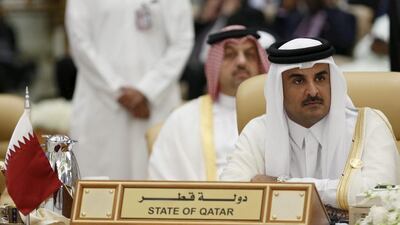At home, Qatar's rulers bankroll international terrorism, host extremists and collude with the regime in Iran. Abroad, however, Doha's rulers present their country as the victim of neighbouring states that, as the entire world knows, have long been casualties of Qatar's malign deeds. But then honesty and integrity are virtues one does not expect to find in a state that connives with Tehran to sow instability in Arab countries, patronises terrorist outfits from Africa to Asia, extends lavish hospitality to the Taliban and a whole host of extremist preachers and televangelists, uses its media assets to spread toxic propaganda and interferes in the internal affairs of neighbouring states with the clear purpose of toppling governments.
Consider the recent tour of Malaysia, Singapore and Indonesia by the Emir of Qatar, Sheikh Tamim bin Hamad Al Thani. Speaking on Wednesday in the Indonesian city of Bogor, Sheikh Tamim claimed that he is "open to dialogue" with the Arab quartet – composed of Saudi Arabia, the United Arab Emirates, Bahrain and Egypt – that severed diplomatic ties with Doha on June 5 in response to Qatar's support for terrorism. "We are all brothers and suffering because of this," he said in reference to fellow Arab states, before denouncing what he termed an "unjust siege" of Qatar.
________________________
Read more
Doha faces greater isolation after ignoring Arab demands
Qatar has trampled on bonds of kinship
The boycott, the office block, and a shadowy campaign against the UAE
________________________
As is always the case with Doha, what went unstated was the truth. In casting Qatar as an innocent victim, Sheikh Tamim conveniently sidestepped the question of causality. For what brought the region to the current impasse is Qatar's own conduct. And in depicting himself as a leader open to talks, he glossed over the fact that Doha, given multiple opportunities to resolve this crisis, rebuffed them all. If Sheikh Tamim considers fellow Arab states to be "brothers", why is it that Qatar has become joined at the hip with Iran, a state that wants nothing more than an Arab fratricide? If Sheikh Tamim is indeed open to talks, why has Doha not demonstrated any contrition for its interference in the affairs of Bahrain, or stopped its financing of terrorism, or even halted the venomous lies disseminated by its state-financed media outlets? If Sheikh Tamim believes Qatar is under siege, how is it that it is able to run a shadowy but well-oiled information war in Western capitals against the UAE and other Arab states?
Given these glaring contradictions between rhetoric and reality, it is hardly surprising that Indonesia's president, Joko Widodo, was not moved by Sheikh Tamim's portrayal of the problem and, in spite of several entreating hints by his guest, refused even to acknowledge it. This is the treatment Qatar receives everywhere these days. Doha's energetic and highly publicised efforts to engage with the world only confirm its increasingly isolated position in it. The message is clear: Qatar cannot expect to be treated as a responsible state as long as it sponsors terror and spreads volatility.
Follow The National's Opinion section on Twitter

